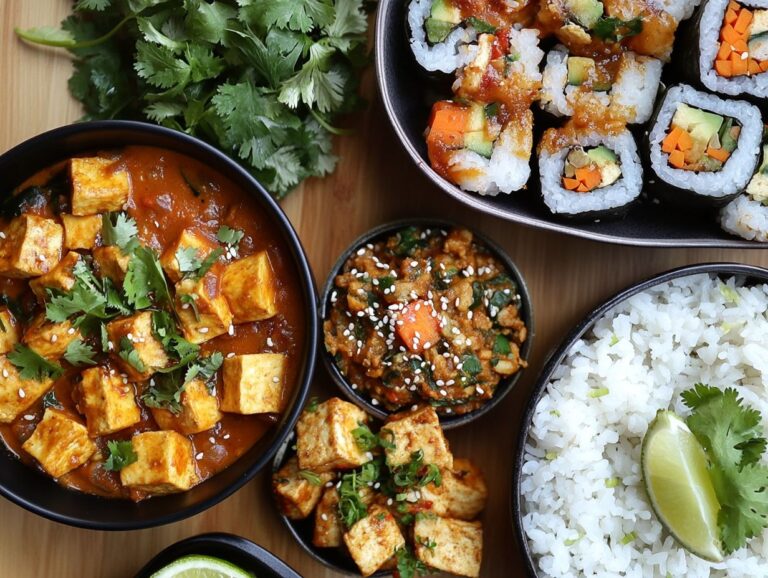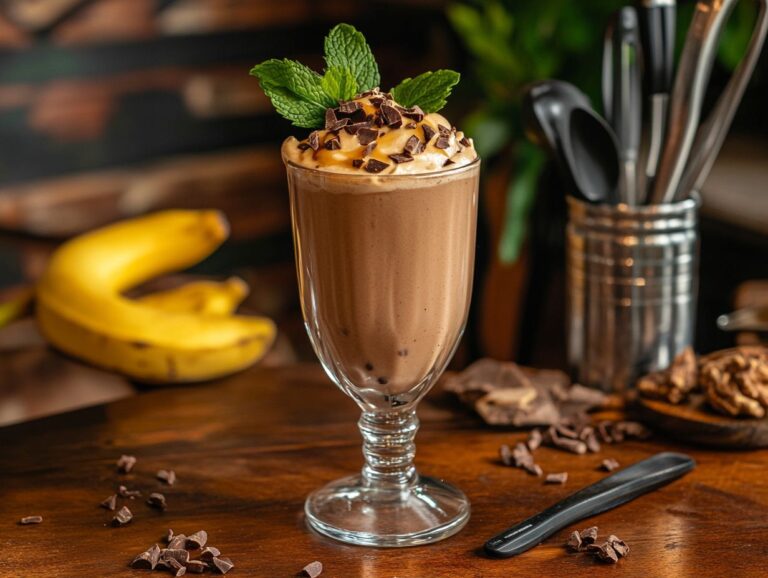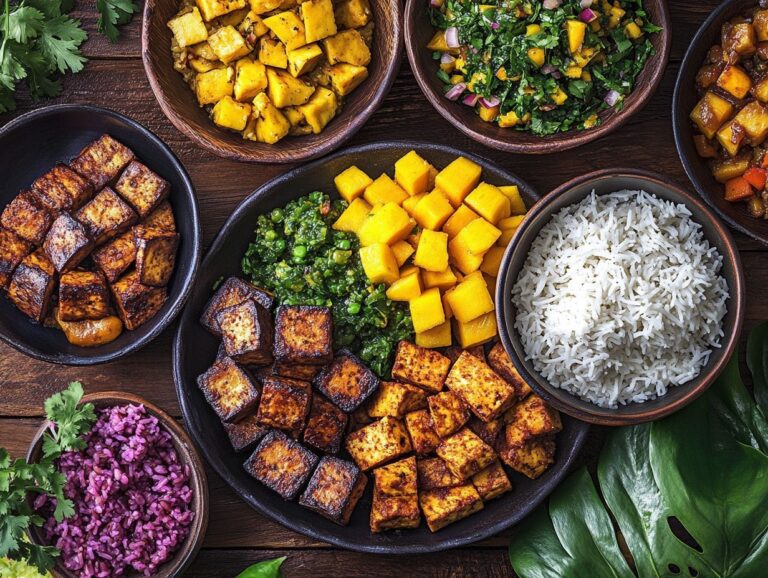A high-protein vegan diet is becoming an increasingly popular choice among bodybuilders and fitness enthusiasts who aim to enhance muscle growth and recovery while adhering to a plant-based lifestyle. This diet offers numerous benefits, particularly its positive impact on overall health. Featuring essential nutrients and effective meal planning, this article provides valuable insights and delicious recipes designed to fuel workouts and help achieve bodybuilding goals without compromising personal values. Prepare to discover how to maximize your gains with a high-protein vegan approach!
What is a High-Protein Vegan Diet?
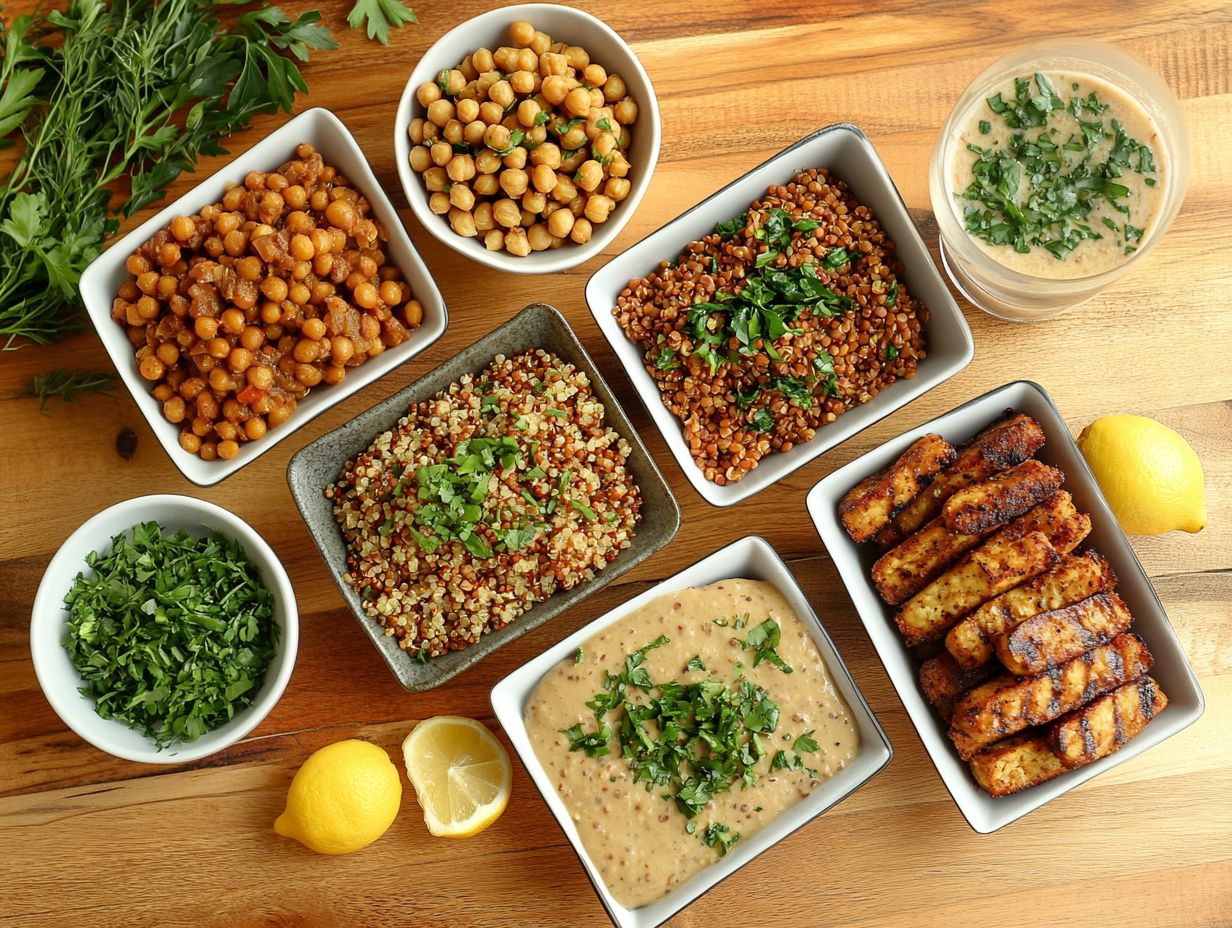
A high-protein vegan diet is designed to meet protein consumption requirements by utilizing plant-based protein sources while avoiding all animal-derived products. This type of vegan diet is ideal for individuals focused on muscle gain and strength training.
A high-protein vegan diet is designed to meet protein consumption requirements by utilizing plant-based protein sources while avoiding all animal-derived products. This diet includes legumes such as lentils and chickpeas, whole grains like quinoa, and protein-rich ingredients such as tofu, tempeh, nuts, and seeds.
These foods provide the essential nutrients needed to achieve fitness goals, particularly in bodybuilding, as well as vitamins, minerals, iron, calcium, B12, and omega-3 fatty acids necessary for overall health. A wide variety of protein sources contributes to a well-balanced meal plan that is both satisfying and nutritionally robust.
For instance, nuts and seeds like almonds and chia seeds offer heart-healthy fatty acids alongside protein, while whole grains provide fiber that aids digestion. Protein bars and vegan snacks made from these ingredients can serve as convenient options.
Vegan athletes can incorporate protein-rich snacks, energy bars, or smoothies into their diet, made with plant-based protein powders derived from peas or rice, to simplify meal planning. Understanding how to balance these components enables individuals to enhance their performance and recovery, thereby supporting their long-term fitness journeys.
Benefits of a High-Protein Vegan Diet for Bodybuilding
A high-protein vegan diet offers several advantages for bodybuilding, including the ability to achieve muscle-building and weight gain goals while adhering to a plant-based lifestyle.
By incorporating protein-rich sources such as seitan, legumes, and protein shakes, athletes can enhance their recovery from workouts, boost their energy levels, and maintain sustained vigor during exercise. Spirulina is another excellent addition to smoothies to increase protein content.
The diverse range of vegan foods allows bodybuilders to meet their nutritional needs while enjoying a variety of flavors and cooking techniques.
Increased Muscle Growth and Recovery
Increased muscle growth and recovery are essential for anyone involved in bodybuilding, and a high-protein vegan diet can effectively support these processes by providing adequate dietary protein intake from plant-based sources such as legumes, nuts, seeds, quinoa, lentils, and chickpeas.
Increased muscle growth and recovery are essential for anyone involved in bodybuilding, and a high-protein vegan diet can effectively support these processes by providing adequate protein intake from plant-based sources. Incorporating ingredients such as legumes, chickpeas, and vegan protein powder into meals ensures a rich supply of amino acids necessary for muscle repair and development. Additionally, including protein shakes and bars in post-workout nutrition can aid in muscle recovery and enhance overall performance.
To optimize muscle-building potential, it is crucial to schedule meals strategically around workout times. Consuming a protein-rich meal or snack one to two hours before exercising provides essential energy and nutrients, while post-workout meals should focus on replenishing glycogen stores and facilitating recovery.
Techniques such as steaming or sautéing vegetables with quinoa and tofu not only enhance flavor but also contribute significant protein. Incorporating vegan protein powder in smoothies or energy bars can further ensure sufficient protein intake. Furthermore, recipe variations like chickpea salads or lentil-based dishes can keep meals exciting and nutritious, ensuring adherence to dietary plans that support continuous muscle growth and effective recovery.
Improved Overall Health
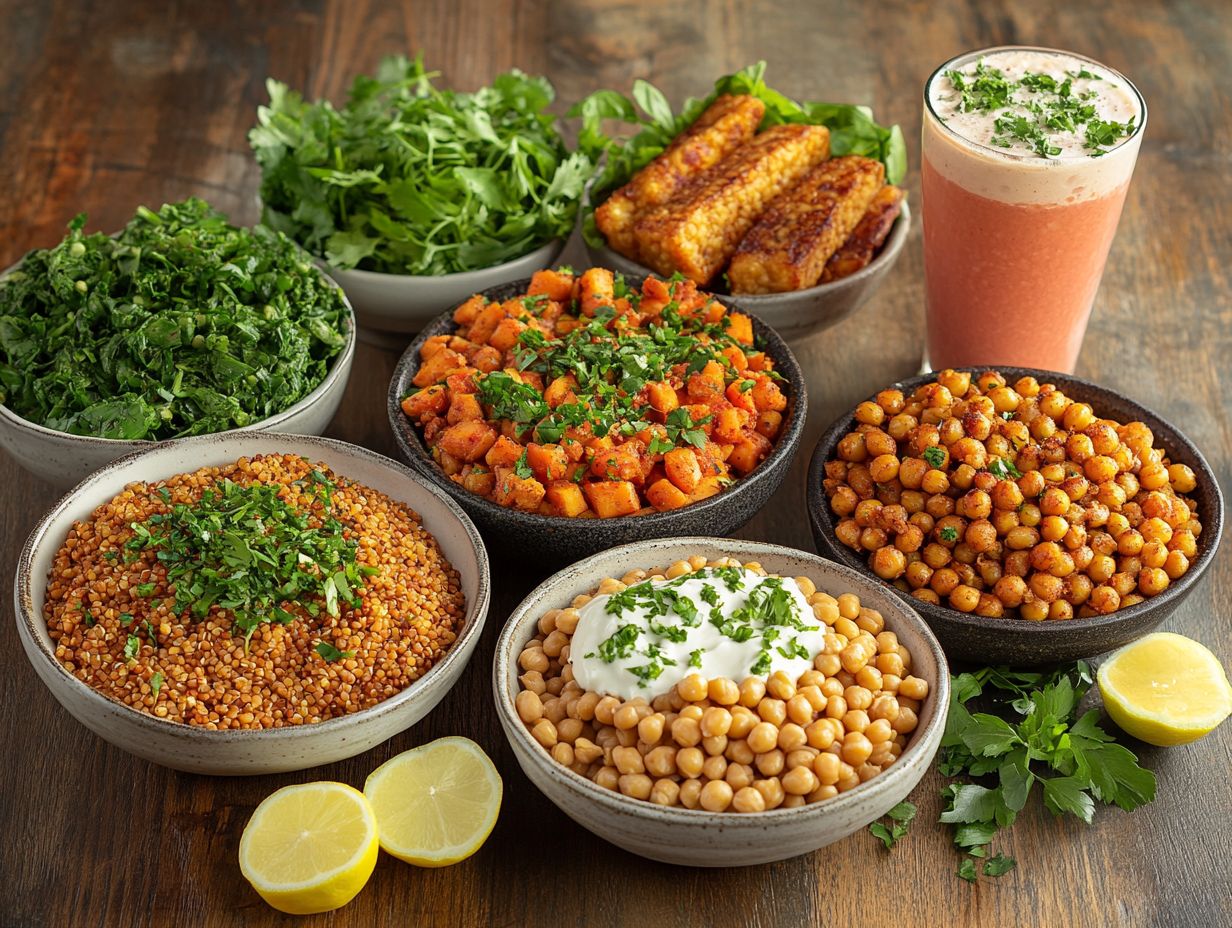
A high-protein vegan diet not only optimizes bodybuilding performance but also promotes overall health by providing essential nutrients such as dietary fiber, vitamins, and minerals.
Incorporating a wide variety of plant-based foods, including whole grains, vegetables, nuts, and seeds, enhances the nutrient density of the diet while reducing the risk of chronic diseases. This type of diet offers gluten-free alternatives and increases healthy fats, both of which are necessary for optimal health.
Key health benefits include improvements in heart health and effective weight management, as plant proteins are generally lower in saturated fats and cholesterol.
A diverse meal plan featuring legumes, quinoa, tempeh, and an array of colorful vegetables ensures that the body receives a broad spectrum of nutrients while offering numerous meal options. Cooking tips, such as preparing protein-rich snacks in advance and using spices to enhance flavors, can further support balanced nutrition.
Ultimately, this lifestyle provides a robust foundation for chronic disease prevention while maximizing wellness through mindful eating. Incorporating whole foods and balanced diet principles, such as consuming a variety of food groups and vegan alternatives, ensures comprehensive nutrition.
Key Nutrients for Vegan Bodybuilding
Key nutrients play a vital role in vegan bodybuilding, enabling individuals to achieve their nutritional goals while following a plant-based diet.
Essential nutrients, including high-quality protein, iron, calcium, and omega-3 fatty acids, can be sourced from carefully selected vegan foods such as legumes, tofu, and quinoa.
Additionally, incorporating nutritional yeast is beneficial, as it boosts the protein content and flavor of meals while being versatile for various cooking methods.
Protein Sources and Requirements
Understanding protein sources and requirements is essential for individuals on a high-protein vegan diet, particularly bodybuilders. Plant-based protein can be derived from various sources, including legumes, nuts and seeds, tofu, tempeh, whole grains, edamame, and spirulina, each offering different levels of protein and unique amino acid profiles.
Understanding protein sources and requirements is essential for individuals on a high-protein vegan diet, particularly bodybuilders. Plant-based protein can be derived from various sources, including legumes, nuts and seeds, and whole grains, each offering different levels of protein and unique amino acid profiles.
To meet daily protein requirements effectively, it is best to consume a wide variety of protein-rich foods and consider their roles in meal preparation and cooking methods.
For example, lentils provide approximately 18 grams of protein per cooked cup, while quinoa contains all nine essential amino acids and roughly 8 grams of protein per cooked cup. Hemp seeds offer around 10 grams of protein per three tablespoons, and almonds contribute about 6 grams of protein per ounce.
By customizing a meal plan that incorporates any combination of these ingredients, individuals can ensure a complete amino acid profile, promoting muscle recovery and supporting overall health. Additionally, incorporating culinary tips such as using spices and herbs can enhance meal flavor and texture.
Other Essential Nutrients to Consider
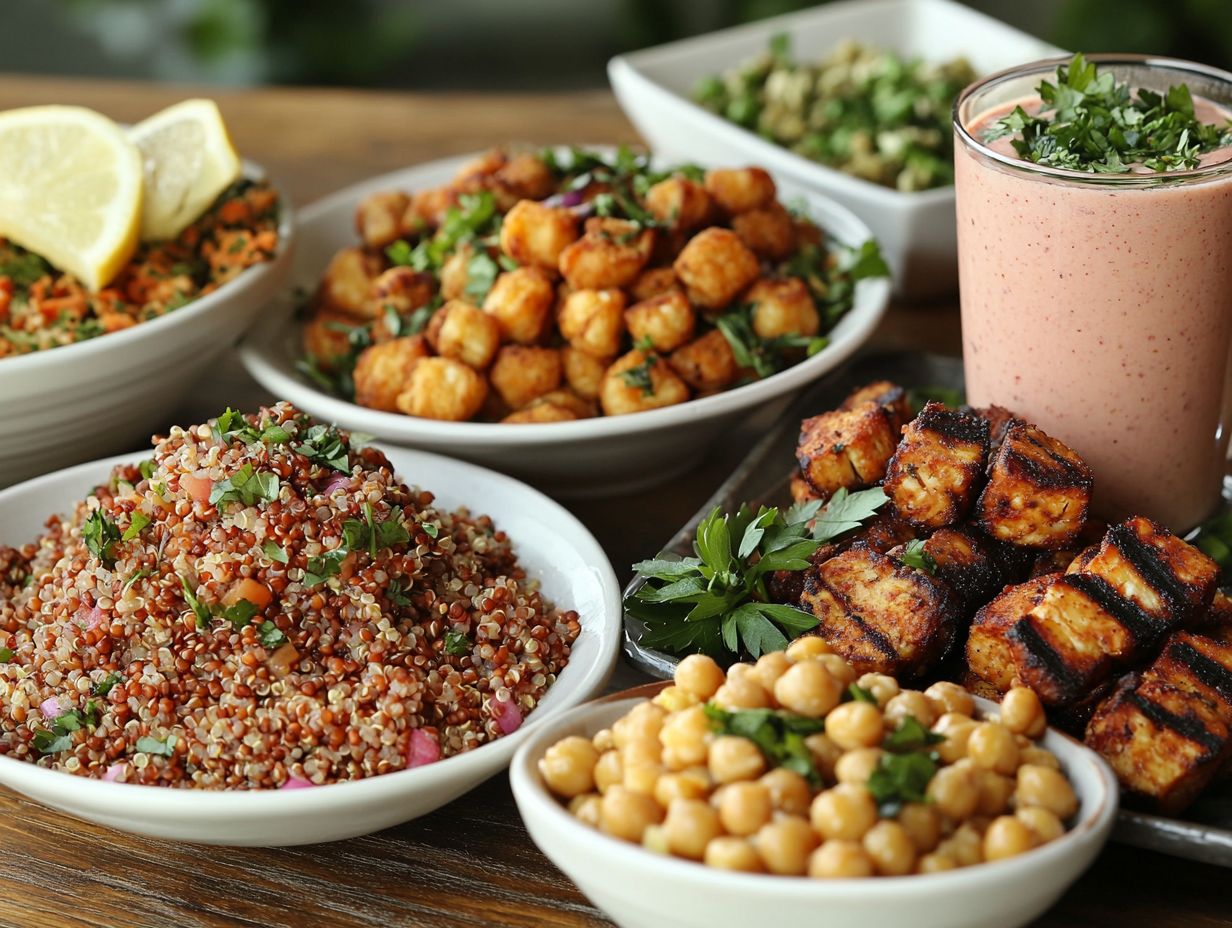
Plus protein, several essential nutrients play a crucial role in supporting vegan bodybuilding. Nutrients such as iron, calcium, omega-3 fatty acids, and various vitamins and minerals are vital for overall health and athletic performance.
These nutrients can be obtained through a balanced diet that includes a variety of foods, such as dark leafy greens, fortified plant-based milk, and chia or flax seeds. Beyond merely counting macronutrients, maintaining a diverse nutrient profile is important for muscle recovery, energy production, and overall well-being.
Iron is essential for transporting oxygen to muscles, which is particularly critical during strenuous exercise, while calcium is necessary for muscle contraction and helps prevent osteoporosis. Omega-3 fatty acids are known to reduce inflammation, aiding in recovery after exercise. Nutrient-rich foods like quinoa, nuts, and legumes serve these important functions. Including iron-rich foods and calcium sources in the diet ensures optimal muscle function.
Additionally, meal delivery services that offer plant-based options can help ensure a balanced intake of these essential nutrients.
High-Protein Vegan Recipes for Bodybuilding
High-protein vegan recipes for bodybuilding provide innovative and nutritious meal options designed to meet the dietary requirements of athletes and fitness enthusiasts. These recipes include a variety of vegan meals that feature protein sources such as tofu, tempeh, and lentils.
High-protein vegan recipes for bodybuilding provide innovative and nutritious meal options designed to meet the dietary requirements of athletes and fitness enthusiasts.
Recipes that incorporate protein-rich ingredients such as tofu, tempeh, legumes, and quinoa can be seamlessly integrated into meal prep routines. Utilizing time-saving recipes and easy recipes ensures that even those with busy schedules can maintain a high-protein vegan diet.
By exploring various cooking methods and flavor profiles, individuals can enjoy a diverse array of meals that support their muscle-building goals without compromising on taste or nutrition.
Breakfast Options
Breakfast is often regarded as the most important meal of the day, particularly for bodybuilders, as it serves as the body’s first source of energy and nutrients after an overnight fast. Including protein pancakes and high-protein vegan cheese in breakfast options can add variety and interest to the meal plan.
The best high-protein breakfasts for bodybuilders should be easy to prepare, nutrient-dense, and suitable for meal prep. Some excellent breakfast ideas high in protein include vegan protein shakes made with protein powder, smoothies packed with nuts and seeds, and oatmeal prepared with legumes.
- Protein shakes made with vegan protein powder
- Smoothies containing nuts and seeds
- Oatmeal prepared with legumes and topped with nutritional yeast, which boosts the protein content and flavor.
These options not only support fitness goals but also facilitate easy meal preparation. Other high-protein breakfasts, such as Greek yogurt parfaits with fruits and granola or scrambled eggs mixed with diced vegetables and feta cheese, can be prepared just as effortlessly as the previously mentioned recipes.
Each recipe can be customized and portioned to align with specific calorie targets and individual hunger needs. Additionally, toppings for oatmeal or nut butters can be adjusted to personal preferences, enhancing the overall enjoyment of the high-protein breakfast experience. Recipes for athletes often include high-protein vegan desserts and veggie burgers, providing meal variety.
Lunch and Dinner Options
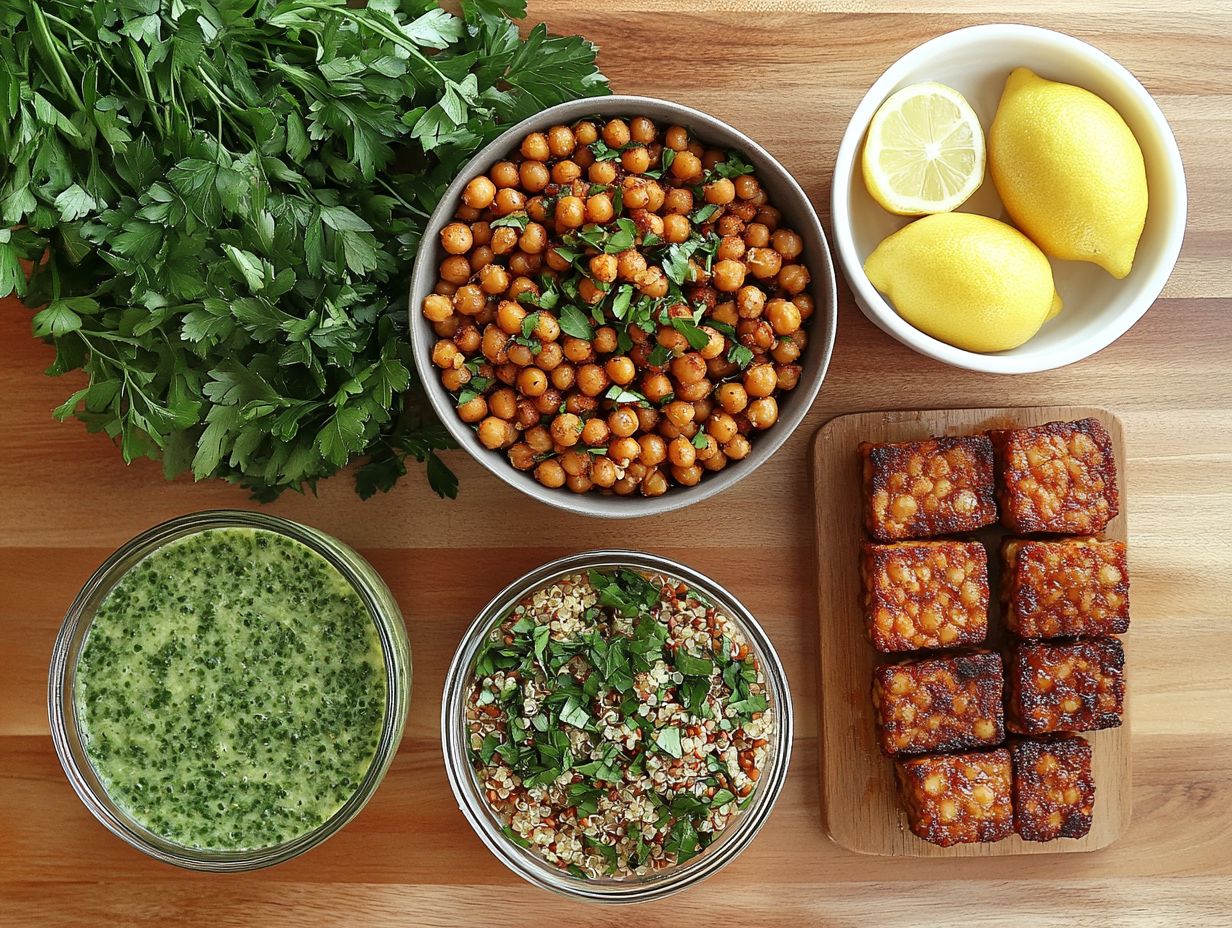
Lunch and dinner options within a high-protein vegan diet can be both satisfying and nutrient-dense, enabling individuals to stay aligned with their bodybuilding goals.
Recipes that feature plant-based protein sources such as seitan stir-fries, lentil soups, or quinoa salads offer the essential fuel needed for muscle recovery and growth. Other options include protein-rich foods like tempeh wraps, protein bars, and edamame snacks, which provide convenient and delicious ways to meet daily protein requirements. By incorporating diverse cooking methods and seasonal ingredients, individuals can enjoy meals that are not only delicious but also supportive of their fitness objectives.
Exploring the rich world of high-protein vegan cuisine allows for the use of ingredients like chickpeas, black beans, edamame, and tofu, all of which are excellent sources of plant protein and dietary fiber.
Cooking techniques such as grilling, baking, and steaming not only enhance the flavors of these meals but also help preserve their nutritional integrity. Combining various protein sources like lentils and quinoa helps create complete amino acid profiles, which are essential for muscle synthesis and strength training.
Whether it’s a hearty black bean burger or a vibrant tempeh salad, each dish contributes to a well-rounded, balanced diet that nourishes the body while satisfying the palate, making vegan meals both exciting and nutritious options for those following a plant-based lifestyle.
Vegan Snack and Dessert Ideas
High-protein vegan snacks and desserts are excellent options for bodybuilding enthusiasts following a plant-based diet, as they help maintain energy levels and support muscle building between meals. Some great ideas include:
- Homemade protein bars or energy bars
- Chia seed puddings with spirulina
- Nut-based treats including vegan cheese and nutritional yeast
All of which can contribute nutritional and caloric value to daily intake. Customizing vegan recipes and exploring flavor enhancement techniques with spices and herbs, individuals can create satisfying snacks tailored to their dietary needs.
Ingredients like chickpeas, lentils, and hemp seeds allow for the creation of options that are not only filling but also provide beneficial healthy fats and protein content. These snacks can be flavored in various ways—spicy, sweet, or savory—to accommodate different taste preferences and dietary protein needs.
By incorporating cocoa powder, maple syrup, or nut butters, high-protein snacks can easily transform into vegan desserts that curb hunger while ensuring proper nutrition. Ultimately, balancing flavors and textures is essential for an enjoyable and nutritious experience, especially for those interested in bodybuilding and muscle gain.
Tips for Incorporating a High-Protein Vegan Diet into a Bodybuilding Routine
Incorporating a high-protein vegan diet into a bodybuilding routine necessitates careful meal planning, strategic timing of meals, and a thorough understanding of supplement options such as vegan protein powder to ensure optimal protein intake for muscle growth and recovery.
By focusing on protein-rich foods and organizing meal prep around workout schedules, individuals can maximize the benefits of their diet, enhancing their fitness and muscle recovery.
Additionally, using supplements such as vegan protein powder and incorporating micronutrients like vitamins and minerals can effectively fill any nutritional gaps while supporting fitness goals.
Vegan Meal Planning and Preparation
Meal planning and preparation are essential for maintaining a high-protein vegan diet, as they ensure access to nutritious meals and simplify the cooking process. Pre-cooking some meals saves time and helps maintain portion sizes that align with dietary goals, supporting a healthy lifestyle.
Properly organizing ingredients and utilizing batch cooking can significantly reduce the burden of meal prep. Designating specific days for cooking allows for the preparation of multiple meals at once, which minimizes the time spent cooking each day, enabling more time for strength training and other fitness activities.
Preparing several dishes simultaneously fosters culinary creativity in food substitutions—such as using farro instead of quinoa or chickpeas instead of lentils—thus increasing protein intake while adding meal variety to meals.
Incorporating seasonal vegetables or other readily available ingredients into easy recipes can further spark culinary creativity, ensuring that healthy eating remains enjoyable and flavorful, contributing to a balanced diet.
Vegan Supplementation Options
Supplementation options are vital components of a high-protein vegan diet, particularly for athletes and those pursuing body composition improvements who need increased protein intake for faster muscle recovery and enhanced performance.
Vegan protein powders and other vegan alternatives can help individuals meet their protein requirements when whole food sources fall short. Additionally, including supplements rich in omega-3 fatty acids, B12, and other essential nutrients such as antioxidants can provide extra support for overall health and energy levels during intense training sessions, aligning with ethical eating practices.
For those following a plant-based lifestyle, it is crucial to consume a diverse array of dietary protein sources. Supplements made from pea protein, brown rice protein, and hemp protein can be beneficial in this regard, as they not only supply the necessary protein but also ensure a complete amino acid profile by combining multiple protein sources.
Strategically timing supplementation, such as consuming protein after exercise, can significantly aid in muscle recovery. Incorporating supplements into daily vegan meals is easy; for instance, adding protein powder to smoothies, oatmeal, or energy bars allows individuals to quickly meet their nutritional needs while enjoying their meals, contributing to their fitness and workout nutrition.


